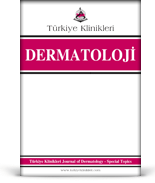Turkiye Klinikleri Journal of Dermatology About Journal


This work is licensed under a Creative Commons Attribution-NonCommercial-NoDerivatives 4.0 International License.
AIMS & SCOPE: Turkiye Klinikleri Journal of Dermatology is a peer-reviewed scientific journal focusing on dermatology. It focuses on issues related to prevention, diagnosis and treatment of skin disorders,
The purpose of the Journal is to share knowledge related to and promoting the development of dermatology. It also aims to enrich the understanding and treatment and management of skin diseases/ dermatology and improve the patient outcomes in Turkey and around the world. The journal provides an opportunity in order to share the research based knowledge, clinical experience and practice besides providing readers with a deeper understanding of dermatology around the world, and the opportunity to enrich their own practices to improve global health in this field.
Turkiye Klinikleri J Dermatol. publishes original retrospective, prospective or experimental research articles, review articles, case reports, editorial comment/discussion, letter to the editor, scientific letter, surgical technique, differential diagnosis, original image, what's your diagnosis?, medical book reviews, questions-answers and also current issues of medical agenda from the field of dermatology.
PRINCIPLES OF RESEARCH AND PUBLISHING ETHICS
Scientific writings submitted to the Turkiye Klinikleri Journal of Dermatology should take into account the guidelines related to the Higher Education Institutions Scientific Research and Publication Ethics , the suggestions of the International Committee of Medical Journal Editors (ICMJE) and International Standards for Editors and Authors of the COPE (Committee on Publication Ethics) . Plagiarism, data falsification or fabrication, duplicate publication, redundant publication and including people who do not contribute to the study among the authors are among the unacceptable practices within the academic rules.
a) Plagiarism: Plagiarism deals with showing others' original ideas, methods, data or works as their own works, partially or completely without appropriate reference to scientific rules. In order to avoid plagiarism, writers must refer to scientific rules in an appropriate way and pay attention to giving reference to all scientific texts included in their research.
b) Data Fabrication: The use of data that are not actually present or have been changed in scientific research is handled within the scope of data fabrication. Authors should collect their data according to ethical rules and analyse it without exposing them to a change that will affect their validity and reliability in the process.
c) Distortion: Changing the records or data obtained from the research, showing unused equipment and materials as if they are used in the research, changing or shaping the results of the research in the interests of the supportive people and organizations are handled within the scope of distortion. Authors should be honest, objective and transparent in the information they provide related to the research process. They must refrain from violating ethical rules.
d) Publication Repetition: Presenting the same publication as separate publications without giving reference to previous publications is handled within the scope of publication repetition. Responsibility for publication of the studies at somewhere else previously or being currently in the evaluation process of another publication organ entirely belongs to the authors. Authors should avoid repetition and be attentive to send authentic and original research studies.
e) Redundant Publication: To disseminate the results of a research as separate publications by disintegrating and fragmenting the research in a way that disrupts the integrity of the research and publishing it in multiple publications are handled within the scope of redundant publication. Authors should consider the integrity of the research and avoid divisions that affect the results.
f) Authorship: Including people who do not contribute to the research among the authors or not including the contributors is covered under unjustified authorship. All authors should have contributed adequately to the planning of the research, the design, the collection of the data, the analysis, the evaluation, the preparation of the research for publication and the presentation of the final state.
g) Ethical Responsibility: The Turkiye Klinikleri Journal of Dermatology adheres to the principles set forth in the Helsinki Declaration (http://www.wma.net/en/30publications/10policies/b3/ index.html) and holds that all reported research involving “Human beings” conducted in accordance with such principles. Reports describing data obtained from research conducted in human participants must contain a statement in the “material and methods” section indicating approval by the institutional ethical review board and affirmation that INFORMED CONSENT was obtained from each participant.
All papers reporting experiments using animals must include a statement in the “material and methods”section giving assurance that all animals have received humane care in compliance with the Guide for the Care and Use of Laboratory Animals (www.nap.edu/catalog/5140.html) and indicating approval by the institutional ethical review board.
Case reports should be accompanied by INFORMED CONSENT whether the identity of the patient is disclosed or not.
COPYRIGHT: All articles, drawings, figures and tables published in Turkiye Klinikleri Journal of Dermatology cannot be reproduced in whole or in part without prior written permission from the publisher. Only for scientific purposes summarizing and quotations can be done with the condition of proper citations listed as references. Responsibility of the articles, figures and photos belongs to authors. And advertising parties are fully responsible for their advertisements.
Turkiye Klinikleri Journals cannot be sold by second parties, but will be distributed to persons in the related fields of health through subscriptions.
PUBLISHER: Turkiye Klinikleri (Ortadogu Reklam Tanitim Yayincilik Turizm Egitim Insaat Sanayi A.S.)
OPEN ACCESS: Content of Turkiye Klinikleri Journal of Dermatology is accessable via the Internet with no-cost by every researcher.
Turkiye Klinikleri Journal of Dermatology doesn't demand any fee for article submission and processing.
For new user registration; please click.
To send articles to Turkiye Klinikleri Journals; please click. (For consideration, all articles must be submitted online. Articles submitted in other forms will not be considered.)
To subscribe and to reach former issues of Turkiye Klinikleri Journals; please click.





.: Process List